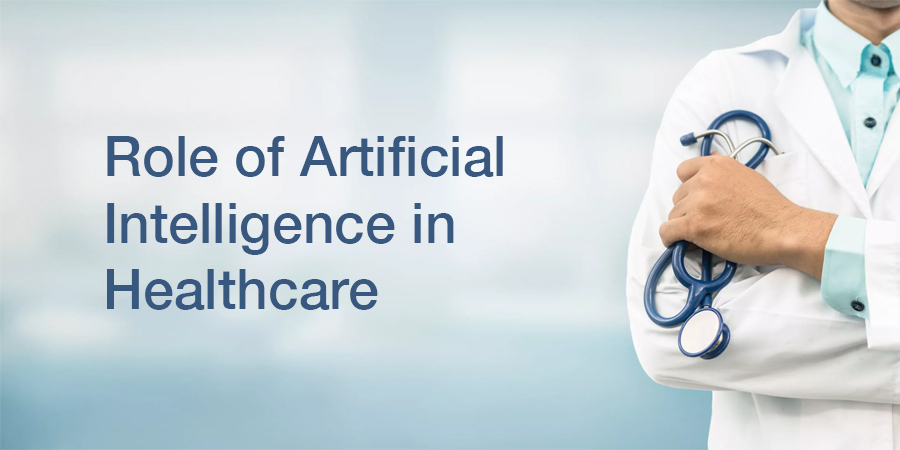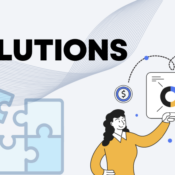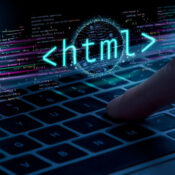09/20/2021
/
Artificial Intelligence in Healthcare
The advantages and applications of AI need no mention. Emerging as next-gen technology, AI is overarching in technological advancements, with its use cases expanding on every horizon.
Artificial Intelligence has the potential to alter discrepancies in the healthcare sector and turn them into opportunities. It simplified a lot of complexity that health professionals face. From administrative processes to different aspects of patient care, pharmaceutical details, tests, complex medical and health care data, billing, and other departments can be managed in a jiffy.
Imagine the convenience that patients and doctors can have by accessing the analyzed data, provided data and prescribed data all in one place. The data can analyze valuable health information and see the merge of AI in the medical industry. Most healthcare technologies and AI have a strong foothold in the healthcare sector and can provide a helping hand.
Continue reading to discover the specific areas that are significantly affected by Artificial Intelligence.
In layman's terms, Artificial intelligence is the evolution and involvement of computer systems to perform tasks that require human intelligence.
For instance, decision making, object detection, solving a complex problem and so on. The Benefits of AI in Healthcare/Medicine are endless. Some of them are increased prediction accuracy, high-level computations, decision making and solving complex problems. AI is expected to make a great impact on the economy and especially in the healthcare sector.
 The main purpose of AI is to produce instant, accurate and dependable data. Many of you would say that Machine Learning does the same. No doubt, the use cases of machine learning in the medical industry knew no bounds, but its expansion demanded a more reliable technology. Two main reasons behind the introduction of AI in Health care are:
The main purpose of AI is to produce instant, accurate and dependable data. Many of you would say that Machine Learning does the same. No doubt, the use cases of machine learning in the medical industry knew no bounds, but its expansion demanded a more reliable technology. Two main reasons behind the introduction of AI in Health care are:

 Management in the medical field can be a real mess if not backed by technical support. The lack of integrated solutions, improper data management, early involvement of healthcare staff and multidisciplinary development are some of the issues that are addressed. These barriers not only degrade the quality of treatment but also put patient’s life at risk.
The implementation of AI has sorted the medical field to a great extent. Data accumulation, drug tracking, progress tracking, and other such tasks have become easier and convenient with AI. However, embedding AI-based clinic workflow and treatment can turn challenging at times, but the insights and information it conveys will support decisions and deepen healthcare professional learning. Artificial Intelligence helps by upgrading clinical training, improving the existing workforce, and promoting ongoing learning to incentivize improved healthcare operations.
Management in the medical field can be a real mess if not backed by technical support. The lack of integrated solutions, improper data management, early involvement of healthcare staff and multidisciplinary development are some of the issues that are addressed. These barriers not only degrade the quality of treatment but also put patient’s life at risk.
The implementation of AI has sorted the medical field to a great extent. Data accumulation, drug tracking, progress tracking, and other such tasks have become easier and convenient with AI. However, embedding AI-based clinic workflow and treatment can turn challenging at times, but the insights and information it conveys will support decisions and deepen healthcare professional learning. Artificial Intelligence helps by upgrading clinical training, improving the existing workforce, and promoting ongoing learning to incentivize improved healthcare operations.
Role of Artificial Intelligence in Healthcare/Medicine?
 The main purpose of AI is to produce instant, accurate and dependable data. Many of you would say that Machine Learning does the same. No doubt, the use cases of machine learning in the medical industry knew no bounds, but its expansion demanded a more reliable technology. Two main reasons behind the introduction of AI in Health care are:
The main purpose of AI is to produce instant, accurate and dependable data. Many of you would say that Machine Learning does the same. No doubt, the use cases of machine learning in the medical industry knew no bounds, but its expansion demanded a more reliable technology. Two main reasons behind the introduction of AI in Health care are:
- High Availability of Medical Data – Hospitals and medical centres need to manage heaps of medical data in the form of medical history, prescriptions, etc. Technologies like deep learning and machine learning require data in excess to implement AI in the medical industry. With tons of data to manage, it becomes easier to implement AI.
- The Introduction of Complex Algorithms – MI is incapable of handling high dimensional data that is processed in the health care industry. In order to process and analyze such high dimension data, technologies like deep learning and neural networks are used. These technologies focus on solving complex problems involving high dimensional data.
Top 5 AI Applications in Medical Field

Management of Medical Data
Hospitals have tons of data to manage, and any kind of negligence can affect the treatment of the patient. Implementation of AI not only enhances customer experience but also collect, store and reformat data for constant access. If easily accessible, data can be studied and analyzed from time to time to take precautionary measures. Availability of data can help improve service acceleration to suggest the best steps that can be taken to accelerate your service quality eventually. This improves call deflection, i.e., decreases the volume of inbound calls and divert customer to other online engagement platforms. Health centres can use this data to drive useful insight and enhance the quality of services. AI can be used for predictive analytics to predict the lead behaviours of customers based on different factors to take appropriate actions. Upon analyzing the behavioural pattern, they can send automated messages to customers to prompt responses or use chatbots to improve instant interaction. Automating tasks using AI not only saves time and effort but also makes things possible that were almost impossible before its advent.Medical Diagnostics
With the help of neural networks and deep learning models, AI is transfiguring the process of medical imaging and diagnosis. Artificial Intelligence is used to diagnose patients with specific diseases. MRI scans can be counted as one of the major applications of AI in medical diagnosis. Complex analyses of MRI scans have turned simpler with the implementation of AI. MRI scans are deeply loaded with information and studying them is not easy. It takes hours to analyze an MRI, and even computers take hours to generate one. But with neural networks and deep learning, it becomes easier.Early Detection
Early detection and prediction of medical conditions can prevent them from getting severe. AI is capable of detecting adverse conditions like heart attacks. We have seen fitness bands, health trackers, Apple watch Fitbit and other such wearables that are capable of monitoring a person’s health and issuing early warning signs. The AI-based wearable can sync and record your heartbeat, pulse rate, sleep cycle, activity level, etc. This data is collected, processed and analyzed for further prediction using machine and deep learning.Drug Discovery
Until the arrival of AI, drug discovery and management of data for drug discovery was a grind. As of now, AI is leveraged by renowned pharmacy companies to streamline the process of drug discovery, meet deadlines and deliver drugs to the market.Patient Engagement
The gap between improved health and ineffective outcomes lies in patient engagement and adherence. The patient’s engagement is of prime importance to retain his well being. Technologies like big data and AI focus on addressing factors that can enhance patient engagement. For instance, the availability of chatbots can allow patients to get instant assistance.The Impact of AI in Healthcare/Medicine
 Management in the medical field can be a real mess if not backed by technical support. The lack of integrated solutions, improper data management, early involvement of healthcare staff and multidisciplinary development are some of the issues that are addressed. These barriers not only degrade the quality of treatment but also put patient’s life at risk.
The implementation of AI has sorted the medical field to a great extent. Data accumulation, drug tracking, progress tracking, and other such tasks have become easier and convenient with AI. However, embedding AI-based clinic workflow and treatment can turn challenging at times, but the insights and information it conveys will support decisions and deepen healthcare professional learning. Artificial Intelligence helps by upgrading clinical training, improving the existing workforce, and promoting ongoing learning to incentivize improved healthcare operations.
Management in the medical field can be a real mess if not backed by technical support. The lack of integrated solutions, improper data management, early involvement of healthcare staff and multidisciplinary development are some of the issues that are addressed. These barriers not only degrade the quality of treatment but also put patient’s life at risk.
The implementation of AI has sorted the medical field to a great extent. Data accumulation, drug tracking, progress tracking, and other such tasks have become easier and convenient with AI. However, embedding AI-based clinic workflow and treatment can turn challenging at times, but the insights and information it conveys will support decisions and deepen healthcare professional learning. Artificial Intelligence helps by upgrading clinical training, improving the existing workforce, and promoting ongoing learning to incentivize improved healthcare operations. Recent Posts
Monika Narriya/0 Comments
Why are ERP solutions important in the education sector?
Monika Narriya/0 Comments
Which is the best ERP solution provider company?
Monika Narriya/0 Comments
How do we select the right ERP solution for our businesses?
Sumit Kumar/0 Comments
9 Most In-Demand Programming Languages for 2024
Sumit Kumar/0 Comments
Best Time to Post on Social Media – 2024 Guide
Sumit Kumar/0 Comments
Why You Should Consider Semantic HTML for SEO
All Categories
- Bing
- Blockchain
- Blog
- Branding
- Case Study
- Content Marketing
- Conversion Rate Optimization
- Cryptocurrency
- Digital Currency
- Digital Marketing
- Email Marketing
- ERP Solutions
- Facebook Marketing
- Google Ads
- Google Updates
- Graphic Designing
- Hire Developers
- Image SEO
- Influencer Marketing
- IT
- Local SEO
- Machine Learning
- Mobile Application Development
- Pay Per Click
- Pinterest SEO
- Podcast Hosting
- React JS
- Reddit & Quora
- Search Engine Optimization
- SEO Copywriting
- Social Media Marketing
- Software
- Software Development
- Technology
- UX and UI
- Web Designs
- Web Hosting
- Website Development
- Website Redesigning
- YouTube SEO








